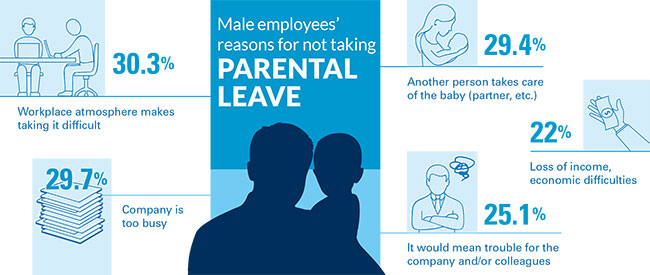- Work problems affect fathers’ ability to help with childcare
- NPO and business team up to support working families
- Policies that support working parents can attract talent
For decades, work was the highest priority for Japanese men: their duties in their job were more important than their role as father. In recent years, we have seen increasing scrutiny of this established “breadwinner“ model of masculinity in Japan, which became particularly evident in the rise of the ikumen phenomenon.
The neologism, coined in 2008, describes fathers who are proactively engaging in childcare. After it was picked up in a speech by then-Minister for Health, Labour and Welfare Akira Nagatsuma in 2010, the trend experienced a boom that brought forth guidebooks, magazines, TV reports and even several Ikumen of the Year contests.
In 2012, the government plunged in and established the Ikumen Project—a large-scale support movement, helping men get involved in the care of their children—designed to fight falling birth rates.
While the boom lost some of its momentum in 2014, current public discussion of male childcare practices shows greater diversity. Terms such as papa tomo (daddy friends) or ikuji (grandfathers providing childcare) have gained popularity.
Ikubosu (work superiors who support mothers and fathers in the workforce and understand their needs) is another term in vogue. Calls for ikubosu are getting louder, especially as problems in the workplace are considered one of the major reasons preventing fathers from being at home more to spend time with their children.
In 2014, only 2.3% of male full-time employees took parental leave. A government study, in 2011, shows that the reasons for such low quotas are mainly work-related (see below).

Businesses unite
One of the country’s most prominent voices in the discussion on modern fatherhood is Fathering Japan. Founded in 2006, the non-profit organisation’s aim is to increase the number of “smiling fathers” nationwide.
It reports that many young men have now realised how important it is to spend time with their children, yet feel under pressure from narrow-minded and unsympathetic managers to ignore the fact.
On its website, Fathering Japan quotes participants in NPO seminars and lectures. One said: “Parental leave? I can’t even take a paid holiday when something is up with the children”. Another comment was, “Please do something about my stubborn boss”.
Fathering Japan responded to these pleas by adding seminars for employers to their event roster. It then founded the Ikuboss Project in March 2014.
At the end of 2014, the organisation joined hands with 11 major Japanese firms, including All Nippon Airways and Mizuho Financial Group, Inc. to found the Ikuboss Company Alliance. This alliance strives to create a network in which participating firms can share knowledge, such as relevant company policies and initiatives.
As an association of childcare-friendly firms, the alliance intends to send a message to society. With Fathering Japan, it plans to organise training events that will foster new ikubosu organisations.
Businesses in Japan are sold on the idea. Since January 2015, major Japanese firms such as Sony Corporation, Shiseido Japan Co., Ltd., and Asahi Breweries, Ltd. have joined. With the addition of the Panasonic Corporation in March 2016, the group boasts 59 members.
While the alliance is dominated by Japanese firms, it also counts among its members the British pharmaceutical giant GlaxoSmithKline K.K. and other European businesses such as the UBS Group AG and Zurich Insurance Group.
Moreover, in summer 2015, Fathering Japan added a new branch—the Ikuboss Company Alliance for Small and Medium Enterprises—which, as of March 2016, includes 37 firms from across Japan.
Government endorsement
The importance of ikubosu has also been acknowledged by the Japanese government. After a 2011 survey concerning parental leave and other care-related systems, the Ministry of Health, Labour and Welfare (MHLW) tabulated the results garnered from 2,086 respondents. Then, as it struggled with low birth rates and demographic ageing, the ministry set up the Ikumen Company Award in 2013, to celebrate businesses with father-friendly policies.
One year later, the MHLW started to confer the Ikuboss Award, which honours family-friendly managers and work superiors.
In 2015, the five conferees of the award included a manager of a large retail shop who was recognised for feats including reducing the anxiety of people returning to work after taking childcare leave and paying attention to employee’s predicaments.
Another awardee, a hospital director, was honoured for establishing a system to support employees by reconciling childcare and work.
In addition, managers who take into consideration childcare needs are promoted in local authorities. In Gunma Prefecture, seminars are currently underway that aim to change the mind-set of employers.
Opportunities for recruitment
The current calls for ikubosu offer foreign firms an opportunity to shine. They are already popular employers among Japanese women who hope for better career opportunities than those offered by domestic firms.
But, with the rise of terms such as ikumen and ikuboss, family-friendly company policies and supportive managers are more important than ever in the contest to attract local talent.
Amending personnel policies and training managers to be more considerate of the needs of young parents among their employees reaps not only status. It is also crucial when recruiting young professionals, who are increasingly paying attention to the compatibility of their work and family life.
Best practice on the ground
By Kathryn Wortley
Best practice by firms in accommodating working parents was the focus of a British Chamber of Commerce in Japan (BCCJ) event in central Tokyo on 29 February.
“Companies will only be open to [flexible working arrangements] if it is in their DNA to want to do things that help their people do better”, said David Bickle, president of the BCCJ.
“By acting as a beacon of best practice and by trying to make changes ourselves, hopefully we will see progress in creating a more family-friendly atmosphere in Japanese companies in general, not just in the progressive ones”.
He welcomed the flexible working approaches of firms such as Google and BT Japan, the projects of which were showcased.
According to Keiko Hirayama, head of search and brand marketing at Google, the biggest issue in Japan for women is how to have a family and a career. The firm is therefore promoting Women Will, its Asia–Pacific project to create flexible working arrangements using technology. In Japan, however, attitudes to work run deep; a practical approach is not sufficient.
“Lots of big Japanese companies have the technology and HR rules to make flexible working happen, but the culture prevents it”, she said. “We need to consider solutions related to both technology and culture”.
Google asked three organisations to take part in a three-month challenge to change their work style. Hiroshima Prefecture’s goal was to reduce overtime hours; KDDI Corporation wanted to increase the number of female managers; and Nissan Motor Corporation were keen to have more staff working from home.
At Nissan, some 100 staff who had never before worked from home were asked to do so. On completion of the trial, 66% of the participants reported an improved work–life balance and a change of mind-set.
While Hirayama said the trials were difficult, key facts were learned, which have been collated in a book designed to help other firms in Japan. Three further trials are planned for later this year.
Under the Women Will umbrella is Happy Back to Work, a website containing more than 1,000 ideas to help working mums. Although designed for mums returning to work after childbirth or full-time childcare, the posts are raising wider issues.
One says: “Let’s stop the idea that people who work long hours are great”. More than 120 firms have pledged online to do this, while more than 4,180 people support the idea.
Another post says: “It is not a case of Dad helping with the housework and childcare, but of Mum and Dad doing it together”. It is being supported by five organisations and more than 1,000 people.
The concept of ikumen and ikubosu among individuals, firms and organisations is not only firmly established, but also seems to be gaining in popularity.







